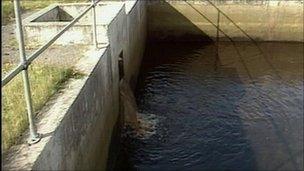Water staff told 'keep quiet' over Camelford poisoning
- Published

Carole Cross, who died in 1994, had large amounts of aluminium in her brain
Staff from a company involved in the UK's worst mass water poisoning were told to keep quiet about what had happened, an inquest has been told.
Twenty tonnes of aluminium sulphate were accidentally added to the water supply in Camelford, Cornwall, in 1988.
A former manager at the South West Water Authority (SWWA) said senior managers did not want the public knowing what had gone wrong that July.
John Lewis was giving evidence at the inquest of a former Camelford resident.
The hearing in Taunton, Somerset, is looking into the death of Carole Cross, who died in 2004.
About 20,000 homes were affected when a relief delivery driver from Bristol mistakenly added aluminium sulphate to the wrong tank at the Lowermoor treatment plant.
After the water poisoning, those who drank or bathed in it reported suffering from stomach cramps, skin rashes, diarrhoea, mouth ulcers and aching joints.
Mr Lewis was the manager for the Fowey district, which included Lowermoor.
He said the company had realised within 48 hours that aluminium sulphate was the likely cause of the contamination.
Mr Lewis, from St Austell, Cornwall, said he had been given "specific instructions" by Leslie Nicks, the head of operations, not to tell the public.
"Basically don't tell anybody what we suspected until we got the driver down to confirm where he had delivered [the aluminium sulphate]," he told the inquest.
He said that he had appeared on the local TV news on 12 July but did not disclose the cause of the contamination, saying he had been told not to do so.
Also giving evidence, Mr Nicks said he had wanted to go public with what had happened but had been overruled.
He said a board meeting had been convened on 13 July, five days after the incident, and he believed a press conference would take place shortly afterwards to inform the public what had happened.
Instead an inquiry began into what had gone wrong.
"I think the biggest mistake we made was to not say what had happened after the board meeting," he said.
The public were only told three weeks later that something had been accidentally added to the water.

Effects of the water poisoning included cramps, rashes, diarrhoea and mouth ulcers
Mr Lewis became the only member of staff to lose his job over the Camelford incident.
"I became the 100% scapegoat for it... for what I regard as political circumstances," he told the inquest.
Mrs Cross, 59, died in 1994 in Taunton after suffering from a brain disease.
She had been living in Camelford at the time of the contamination.
Large amounts of aluminium were found in her brain after her death.
The original inquest into her death was adjourned two years ago, when the coroner asked for more tests into the possible links between aluminium and brain disease to be carried out.
The hearing is expected to take two weeks.
- Published1 November 2010
- Published1 November 2010